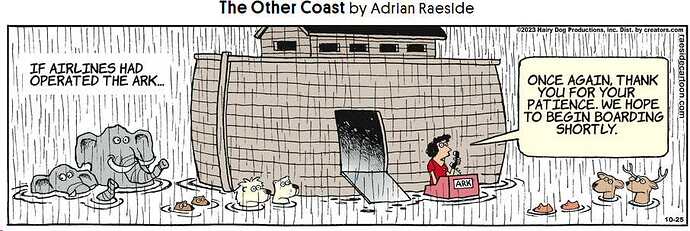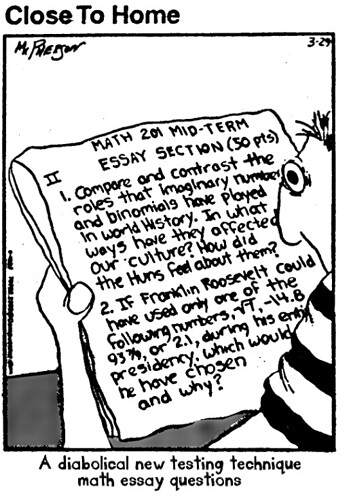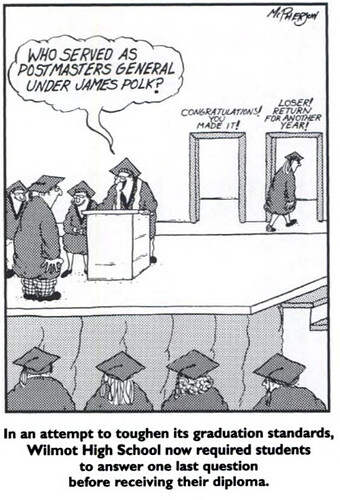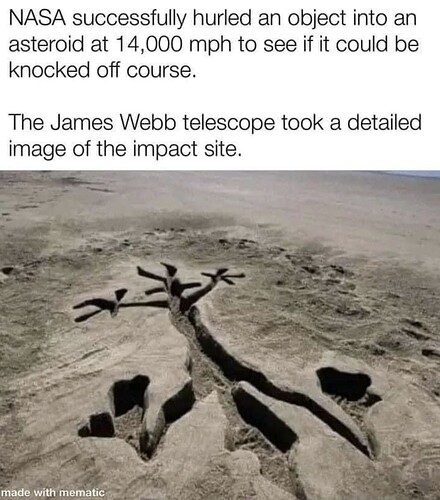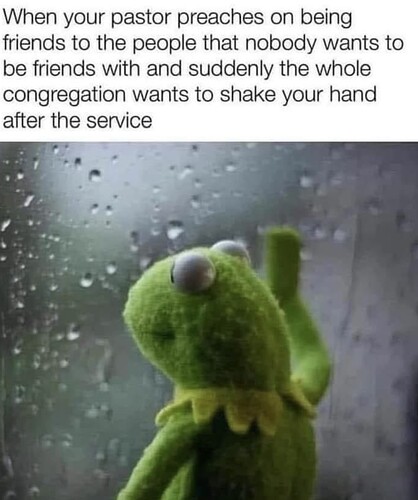The Pun-Dementals: Biblical Limericks, from Verse to Bad - David C. Campbell, Timothy D. Campbell - Google Books will keep you supplied with biblical limericks for a while, despite aiming for both clean and comical.
Oh my goodness! Your family does EVERYTHING!
This is awesome! My family love limericks and puns, and combining them with clean and Bible makes it even better! I’m sharing this with them and also my brothers in law.
Thanks.
Randy
The answer the next graduation candidate is looking for, by the way, is Cave Johnson. Just in case any of you aren’t up to Wilmot High graduation standards!
Outstanding idea! Getting the engineering-bound students writing!
However, essay questions should be testing the students’ grasp of the taught material and skills being developed, rather than be sprung on students out of the blue. So, Mr. Bitikofer, you have obviously been teaching or working in conjunction with a social science teacher and history teacher, who have been helping students see the real-world application of these math concepts.
I love the ways that creative teachers work together to integrate subjects so that students learn to look at the world as a whole rather than a collection of isolated ideas.
Now, if only we could get the social studies teachers to throw an algebra problem or two onto their exams!![]()
Maybe not directly, but demonstrate the value of mathematics and mathematical thinking in every day applications. This kind of teaching (and the thinking that results from it) takes a lot of talking and working together, both teachers needing to learn to think in different ways about their own subject matter as well as the others’.
Have you ever talked to a foreign language teacher about the similarities in thinking skills needed for learning and using math and language? How could the structural understanding of language help the verbally gifted, mathematically challenged student start to employ their deep grasp of language forms to understand the “grammar” and production of mathetmatical structures and concepts?
What are the physical, real-world implications of the concept of multiplying by -1,and how does that help one (me) understand how to correct a mis-spooled roll of microfilm?
We reviewed a lot of math concepts (for me: natural logs) during COVID to understand better the way things were being reported and why. Real world applications of math concepts that help adults understand why things are NOT conspiracies of obfuscation in the news are things kids can be learning about NOW in the classroom.
And on and on and on. The more connections between what kids “have” already, the more hooks they are developing to add new learning.
Yes! - and not just negative numbers, but even just the concept of “zero”, the use of which was not so apparently obvious to the ancients as we take it for granted today. I don’t know if you read the actual essay questions in the top cartoon above - but they are a rather silly parody of trying to pair these subjects together in some holistic way. And the humor shouldn’t detract from the serious thought of really seeing all of this together exactly as you suggest. I now consider myself more of a student of history, language arts, and philosophies in ways that I wouldn’t have so much as a young man more excited to concentrate on his own preferred subject areas. And even within my own preferred subject areas, the more I learn the more I see that I’ve only barely scratched the surface even in those things.
Or when the entire 20-40 age group is in service and the pastor is saying he feels that god wants us to all do volunteer work after a hurricane and the house is his mom’s house with almost no damage but getting a complete remodel and if you feel god putting it on your heart to go that weekend and begin volunteering. So every single person goes to the altar but you don’t and you tell them you feel the Holy Spirit putting it on your heart to instead go mushroom foraging.
ANTH 317
Survey of nothing from anthropological, historical, and philosophical perspectives. The student is expected to integrate experiential insights to deepen understanding of nothing in particular, and further appreciate the relative significance of nothing.
Prerequisite: nothing
Yes, I carefully read the questions, as I do all essay questions from training. I particularly like the one section asking how the Huns felt about imaginary numbers and binomials.
; )
This all sounds like a very good argument for broad-based liberal education
I may not be the poster child, but I am certainly an advocate!
Would’ve had the Huns pegged for a question regarding three digit numbers.
Advanced Hun Math?
There could be hundreds of good questions.
Not quite a proper limerick, but near to:
Ode Upon Microflora
Belly flower, O belly flower,
Why art thou not a smelly flower?
Form so tiny, beauty exquisite,
Delighting the eye,
But the nose says, “Where is it??”
